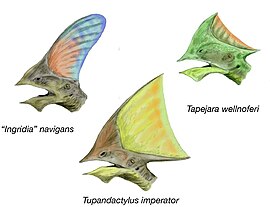Tapejaridae
 Tapejara a Tupandactylus, zástupci čeledi | |
| Vědecká klasifikace | |
| Říše | živočichové (Animalia) |
| Kmen | strunatci (Chordata) |
| Podkmen | obratlovci (Vertebrata) |
| Třída | plazi (Sauropsida) |
| Řád | ptakoještěři (Pterosauria) |
| Podřád | Pterodactyloidea |
| Nadčeleď | Azhdarchoidea |
| Čeleď | Tapejaridae Kellner, 1989 |
| Některá data mohou pocházet z datové položky. | |
Tapejaridae (z indiánského jazyka Tupi = "staré bytosti") byla čeleď pterodaktyloidních ptakoještěrů, žijících v období spodní křídy na území dnešní Brazílie, Číny, USA a Velké Británie.[1] Jejich vývojový původ sahá geograficky nejspíše do Asie.
Novější objevy ukazují, že tito pterosauři byli početní a diverzifikovaní ještě na konci křídové periody (geologický věk maastricht, před 72 až 66 miliony let) a vyhynuli až na konci tohoto období při velkém vymírání na konci křídy.[2]
Klasifikace
Tapejaridé jsou obvykle řazeni do dvou podčeledí - Tapejarinae (rody Afrotapejara, Huaxiapterus, Sinopterus, Tapejara a Tupandactylus) a Thalassodrominae (Thalassodromeus a Tupuxuara). Některé novější kladistické analýzy však toto rozdělení nepodporují. Příbuznost tapejaridů s ostatními azdarchoidy není dosud uspokojivě vyjasněna. Pravděpodobné místo vzniku této skupiny je na pevninách jižní polokoule, tedy superkontinentu Gondwany.[3]
Odkazy
Reference
- ↑ David M. Martill, Mick Green, Roy Smith, Megan Jacobs & John Winch (2020). First tapejarid pterosaur from the Wessex Formation (Wealden Group: Lower Cretaceous, Barremian) of the United Kingdom. Cretaceous Research. 104487. doi: https://doi.org/10.1016/j.cretres.2020.104487
- ↑ Hebert Bruno Nascimento Campos (2021). A new azhdarchoid pterosaur from the Late Cretaceous Javelina Formation of Texas. Biologia. doi: https://doi.org/10.1007/s11756-021-00841-7
- ↑ Gabriela M. Cerqueira, Mateus A.C. Santos, Maikon F. Marks, Juliana M. Sayão, and Felipe L. Pinheiro (2021). A new azhdarchoid pterosaur from the Lower Cretaceous of Brazil and the paleobiogeography of the Tapejaridae. Acta Palaeontologica Polonica. doi: https://doi.org/10.4202/app.00848.2020
Literatura
- Lü, J., Jin, X., Unwin, D.M., Zhao, L., Azuma, Y., and Ji, Q. (2006). A new species of Huaxiapterus (Pterosauria: Pterodactyloidea) from the Lower Cretaceous of western Liaoning, China with comments on the systematics of tapejarid pterosaurs. Acta Geologica Sinica 80(3):315-326.
- Kellner, A.W.A.; and Campos, D.A. (2007). "Short note on the ingroup relationships of the Tapejaridae (Pterosauria, Pterodactyloidea)". Boletim do Museu Nacional 75: 1–14.
- Lü, J., Unwin, D.M., Xu, L., and Zhang, X. (2008). "A new azhdarchoid pterosaur from the Lower Cretaceous of China and its implications for pterosaur phylogeny and evolution." Naturwissenschaften
- Martill, D.M., Bechly, G., and Heads, S.W. (2007). "Appendix: species list for the Crato Formation." In: Martill, D.M., Bechly, G., and Loveridge, R.F. (eds.), 2007. The Crato Fossil Beds of Brazil: Window into an Ancient World. Cambridge University Press, Cambridge. Pp. 582–607.
- Martill, D.M. and Naish, D. (2006). "Cranial crest development in the azhdarchoid pterosaur Tupuxuara, with a review of the genus and tapejarid monophyly." Palaeontology, 49: 925-941.
- Xin Cheng, Renan A. M. Bantim, Juliana M. Sayão, Xinjun Zhang, Shunxing Jiang, Alexander W. A. Kellner, Xiaolin Wang & Antônio Á. F. Saraiva (2020). Short note on the vertebral column of the Tapejaridae (Pterosauria, Pterodactyloidea) based on a new specimen from the Crato formation (late Aptian, Early Cretaceous), northeast Brazil. Journal of South American Earth Sciences, 102921. doi: https://doi.org/10.1016/j.jsames.2020.102921
Externí odkazy
 Obrázky, zvuky či videa k tématu Tapejaridae na Wikimedia Commons
Obrázky, zvuky či videa k tématu Tapejaridae na Wikimedia Commons
Média použitá na této stránce
Autor:
- Information-silk.png: Mark James
- derivative work: KSiOM(Talk)
A tiny blue 'i' information icon converted from the Silk icon set at famfamfam.com
Autor: Nobu Tamura (http://spinops.blogspot.com), Licence: CC BY 3.0
Pencil drawing of the heads of the 3 species that have historically been assigned to the genus Tapejara, a pterosaur genus from the Early Cretaceous of Brazil. The crest of T. wellnhoferi is only partially known and its representation here is hypothetical. "Ingridia" navigans and T. imperator have since been reclassified as a species of Tupandactylus.

